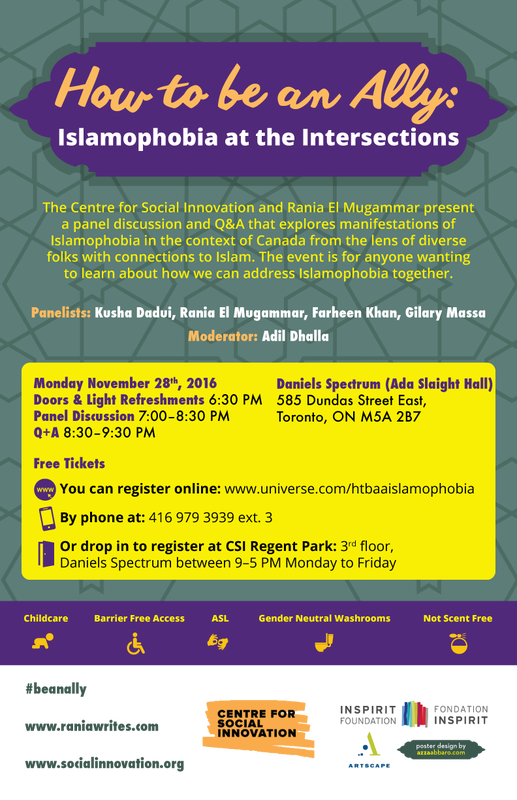Livestream footage islamophobia at the intersections
ABOUT THE EVENTThe Centre for Social Innovation and Rania El Mugammar are collaborating to present a panel discussion on Islamophobia as it manifests itself in the Canadian cultural landscape. The panel takes an intersectional approach to exploring how Islamophobic violence impacts other types of oppression and chronic exclusion to create new barriers and nuanced lived experiences. This event is made possible through generous support from the Inspirit Foundation, Artscape and community partners.
The event is a panel discussion and Q&A that explores manifestations of Islamophobia in the context of Canada from the lens of diverse folks with spiritual, ancestral, religious, cultural and familial connections to Islam. The event will focus on community organizing strategies, building safe spaces for Muslims from diverse backgrounds and lived experiences and addressing the different ways in which Islamophobia manifests itself at the internalized, interpersonal and institutional levels. Finally, the event is for anyone wanting to learn about how we can address Islamophobia. |
ISlamophobia in Canada: Violence & Systemic discrimination |
As public discourse in the Canadian cultural mainstream as well as global discourse surrounding Islam becomes increasingly discriminatory, Islamophobic language, attitudes and policies are a rising trend.
“Islamophobia is defined technically as an irrational fear of Islam and a hatred or extreme dislike of Muslims. However, the term now can also include attacks on Muslims and their faith. Fear has led some to discriminate against, demonize and dehumanize Muslims. Political terrorism, globalization and social media have led to negative attitudes, violence, harassment, discrimination and stereotyping of Muslims. The Berkley Institute on Racism Studies lists five prevailing beliefs as elements of Islamophobia. They report that Islam is often seen as: • monolithic and unable adapt to new realities; • not sharing common values with other major faiths; • a religion inferior to the West; is archaic, barbaric, and irrational; • a religion of violence, which supports terrorism; and • a violent political ideology” - NCCM Islamophobia Guide for Educators This discourse manifests on a personal, interpersonal and institutional level impacting Canada’s nearly 940,000 Muslims. Islamophobia is an oppression which intersects with other facets of an individual’s identities, coloring their experience with this particular spectrum of violence. In a Canadian context, hate crimes motivated by Islamophobia have doubled in recent years, with an alarming rise in attacks against individuals (rather than community spaces/property damage). With more than 90% of victims identified as visibly Muslim women/femmes (wearing hijab/niqab) such as a recent widely publicized case in Toronto. This precarious intersection of misogyny and Islamophobia further endangers vulnerable members of our communities. Discriminatory sentiments and attitudes against Muslims are on the rise in Canada, particularly in Quebec, where conversations surrounding the hijab in public spheres have mirrored violent discourse in France. On an institutional level, this discourse informs the criminalizing of Muslims and Muslim communities through legislation and policy presented under the umbrella of national security and gender based violence prevention. Race and religion intersect in discourse surrounding immigration and racial profiling, misogyny, Islamophobia and racism collide in the rhetoric surrounding the bodies of Muslim women. Other systemic manifestations include workplace discrimination, exclusion and oppression in academic institutions and beyond. “The social implications of these results are disturbing because they can contribute to silencing, marginalization or exclusion of Canadian Muslims if they are seen as not quite belonging or if they always have to justify and explain themselves in ways which other Canadians are not expected to do so. Furthermore, while the conflation of categories of Muslim with racialized minority and/or immigrants may reflect socio-demographic changes in Canadian society, it also reflects the ways in which different kinds of discrimination may overlap. This reinforces negative views of Canadian Muslims, leading to social divisions which are detrimental to social cohesion.” - OHRC Special Issue of Diversity Magazine |
HOW TO BE AN ALLY |
Our panel will explore strategies for building safe and inclusive spaces for Muslim identifying folks living at diverse and nuanced intersections. Unlearning internalized and interpersonal Islamophobia, confronting manifestations of this form of violence in our movements, spaces, organizations and institutions is central to the goals of this panel.
The role of allies, bystanders, cultural curators and place makers in building equitable and accessible spaces for Muslims will be explored in our content and question period. We will use content generated from this discussion to create a tip sheet which can be used as a tool in confronting Islamophobia in our communities. |
